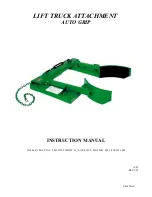
7-22
FLUSHING AND REFILLING OF RADIATOR
FLUSHING AND REFILLING OF RADIATOR
Change coolant
Change coolant
Avoid prolonged and repeated skin contact
Avoid prolonged and repeated skin contact
with used antifreeze. Such prolonged
with used antifreeze. Such prolonged
repeated contact can cause skin disorders or
repeated contact can cause skin disorders or
other bodily injury.
other bodily injury.
Avoid excessive contact-wash thoroughly
Avoid excessive contact-wash thoroughly
after contact.
after contact.
Keep out of reach of children.
Keep out of reach of children.
Protect the environment : Handling and
Protect the environment : Handling and
disposal of used antifreeze can be subject to
disposal of used antifreeze can be subject to
federal, state, and local law regulation.
federal, state, and local law regulation.
Use authorized waste disposal facilities,
Use authorized waste disposal facilities,
including civic amenity sites and garages
including civic amenity sites and garages
providing authorized facilities for the receipt
providing authorized facilities for the receipt
of used antifreeze.
of used antifreeze.
If in doubt, contact your local authorities for
If in doubt, contact your local authorities for
guidance as to proper handling of used
guidance as to proper handling of used
antifreeze.
antifreeze.
4)
4)
(1)
(1)
※
A
B
FULL
LOW
2
1
CHECK COOLANT LEVEL
CHECK COOLANT LEVEL
Check the coolant level at reservoir tank when
the engine is cooled.
Add the mixture of antifreeze and water after
removing the cap of the reservoir tank if coolant
is not sufficient.
The coolant level should indicate between FULL
and LOW.
Replace gasket of surge tank cap when it is
damaged.
Do not remove the surge tank cap from a hot
Do not remove the surge tank cap from a hot
engine. Wait until the coolant temperature is
engine. Wait until the coolant temperature is
below 50
below 50 ˚C
C (120
(120 ˚F) before removing the
F) before removing the
surge tank cap. Heated coolant spray or
surge tank cap. Heated coolant spray or
steam can cause personal injury.
steam can cause personal injury.
Do not add cold coolant to a hot engine ;
Do not add cold coolant to a hot engine ;
engine castings can be damaged. Allow the
engine castings can be damaged. Allow the
engine to cool to below 50
engine to cool to below 50 ˚C (120
(120 ˚F) before
F) before
adding coolant.
adding coolant.
3)
3)
(1)
(2)
(3)
(4)
※
110D9OM61A
110D9MI30
110D9MI31
1
Surge tank cap
2 Reservoir
tank
A FULL
B LOW





































